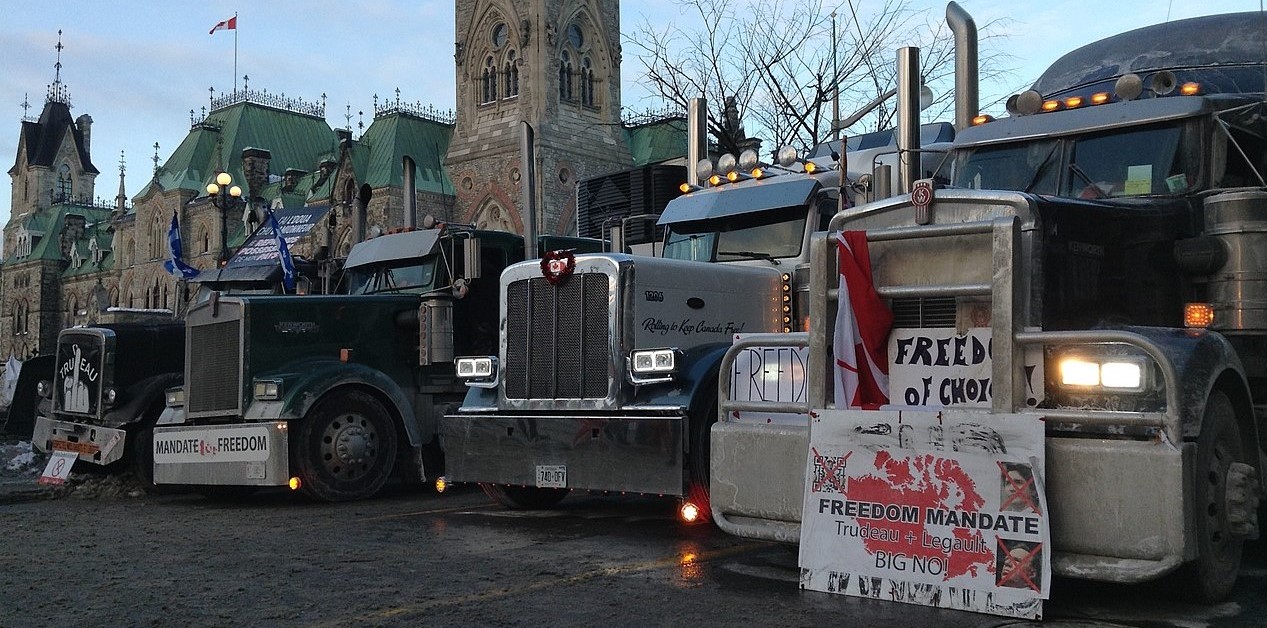February 8, 2022
-Global News
For Ottawa residents living downtown, Tuesday may mark their first taste of relief in 12 days as a temporary court injunction takes effect that orders truckers in the so-called “Freedom Convoy” to stop blaring their horns.

But McLean did grant an injunction for 10 days, and it remains to be seen whether that will be extended if demonstrators remain in the city.
Here is what we know about the terms of the injunction.
What does this mean for horn-honking?
The wording of McLean’s injunction states that anyone not working with a municipal fire department is prohibited from using “air horns or train horns” within the area covered by the injunction.
That applies to any streets in downtown Ottawa, defined in the injunction as “any streets north of Highway 417, otherwise known as the Queensway.”
A large part of the area has been hard-hit by the encampments set up by the trucker convoy over recent weeks. Police have launched more than 60 criminal investigations into alleged hateful, threatening or violent conduct against residents of the neighbourhoods that stretch from the highway north toward Parliament Hill, where residents have been forced to endure deafening honking for days.
McLean’s order also directed the three main organizers of the convoy to share the injunction through their social media as well as any other channels “to all persons they know who are or who have been participating” in the convoy between Jan. 28 and now.
What extra powers does it grant to police?
Included in the injunction is the authority for police to crack down on those who violate it.
Specifically, the injunction grants police the power to “arrest and remove any person who has knowledge of this Order and who the Police have reasonable and probable grounds to believe is contravening or has contravened any provision of this Order.”
Police still have the discretion to decide how and when — or if — to do so.
The injunction states that the “timing and manner” of enforcing it is up to police, as is the authority to release anyone arrested for violating the injunction if that person signs a written promise to abide by it.
Ottawa’s deputy police chief, Steve Bell, confirmed during a press conference on Tuesday that officers “will exercise their discretion in enforcing this order.”
“Work is underway to fully brief all officers on the terms of the order and their role in enforcing it,” Bell said. “We continue to capture and document evidence. We will have an update on this later today.”
As well, the injunction also makes clear that ordering an end to the honking of horns is not an order for the convoy demonstrators to pack up and go home.
McLean states in it that so long as the terms of the injunction are respected, the organizers and anyone else taking part are free to continue so long as they engage in “a peaceful, lawful and safe protest.”
On Feb. 16, the court will meet again to hear whether the 10-day injunction should be extended.
What happens next?
Noise levels across much of the impacted areas appeared to be lower on Tuesday after weekend levels that saw local and federal officials saying that residents were hitting their “breaking point.”
Yasir Naqvi, Liberal MP for Ottawa Centre, described the noise as “torturous” for his constituents.
Catherine McKenney, local councillor for one of the hardest-hit wards, thanked Champ and Li after news of the injunction came out, saying that they had done “more than any level of government after 10 days of illegal occupation.”
“Residents in the downtown are finally getting action to stop some of the terror they’ve been living under,” McKenney wrote on Twitter.
It remains unclear, however, how long the convoy will remain encamped in the city.
Police have been stepping up what Chief Peter Sloly called a “surge and contain” strategy over the past several days, though on Monday he warned an additional 1,800 officers are needed.
Sloly has said Ottawa police were “overwhelmed” by the number of people taking part in the convoy, which quickly set up staging areas and infrastructure in several locations across the city.
Over the weekend, the police said anyone bringing jerry cans of fuel to the convoy would be charged.
The extent of that enforcement is not yet fully clear.




